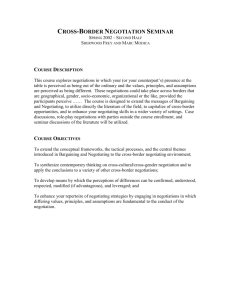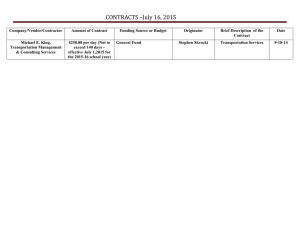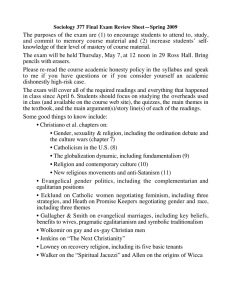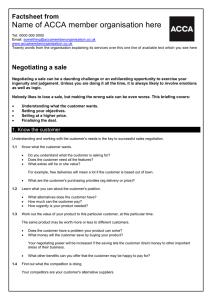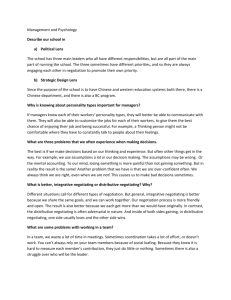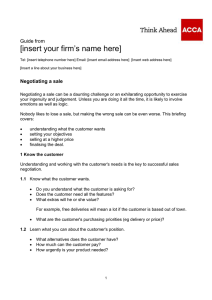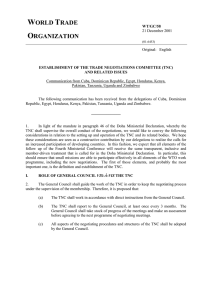CONSULTING and NEGOTIATING CONTRACTS Alex Turner, Ph.D., FACMP
advertisement
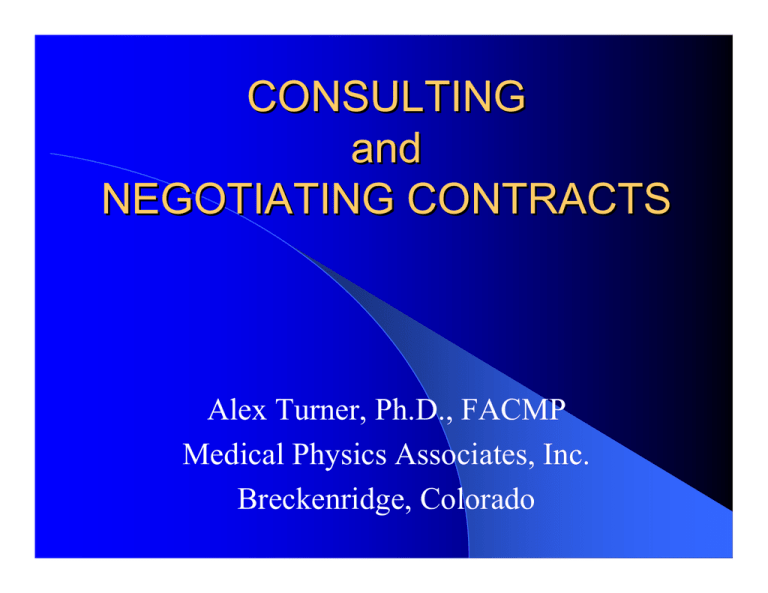
CONSULTING and NEGOTIATING CONTRACTS Alex Turner, Ph.D., FACMP Medical Physics Associates, Inc. Breckenridge, Colorado Gaining Experience Good judgement comes from experience, and a lot of that comes from bad judgement Will Rogers Contracting Experience 10 years experience with free standing RO Began consulting in 1982 Volume based contracts I provided equipment & personnel Fee for patient services, fixed for physics For 8 years, no contract renegotiations Contracting Experience About 1990, hospitals & facilities wanted to change to a fixed reimbursement contract Changing from volume based to fixed amount required growth conditions Difficult to plan for equipment and personnel additions to meet growth Medical Physics Consulting The BUSINESS of providing medical physics services, not the technical nature of the service Incorporate? No - Self employment tax vs Yes - State franchise tax & unemployment tax, social security, corporation income tax, etc. Preparing to be a Consultant Identifying Skills Personal – communication Professional – specialist and/or generalist Business – accounting, scheduling, reports, etc. Marketing – develop strategy to reach clients How Clients Find Consultants Recommendations - Reputation Active in local & national societies Active in community affairs AAPM Blue Book Examples - What Clients Want Good communicator with all staff Services provided meet recognized standards Serves professional & administrative staff Problem solver Compliance with State and NRC Regulations Be visible Stay current - technology, procedures, regulations Examples – What Physicists Want Who do I report to What/who am I responsible for Is in-house staffing appropriate Radiation Safety - Do I report to management who can make binding decisions for the facility Is facility equipment satisfactory for services. Does my equipment meet their needs Compensation Contractor or Employee Tax Reform Act of 1986 Termed the “Right-to-control test” for the purposes of Federal Employment Taxes and Income Tax Withholding Permits the IRS to apply 20 tests to determine who controls how work is done – not all 20 tests have to apply Contractor or Employee Employee Facility instructs worker on when, where and how work is to be done May be terminated immediately and arbitrarily Contractor or Employee Independent Contractor Retains the right to control the manner in which the work is being done, and must provide own benefits Termination clause specified in contract Contracts A contract is an agreement specifying the relationship between parties – verbal or written It should be executed in “good faith” by both parties to avoid disputes over what was agreed upon – in easy to understand language Contracts Small jobs - avoid excessive legalistic language Letter of Agreement or P.O. may be sufficient (do not mix moonlighting with day job) Long term jobs – includes legalistic language Often involves human resources and attorneys A retainer is good fiscal policy – cash flow needs Negotiating Negotiating focuses on gaining the confidence of a prospective client The purpose of Negotiating is to resolve situations where what the client needs conflict with services you can offer The aim of Negotiating is a win-win solution acceptable to both parties Negotiating Strategy Talk services/value first, then cost Provide details on services to be provided You are in control – listen to client’s needs, then tell client what has to be done Offer client options if necessary Do not be vague Propose in writing, client has something to study Preparation goal – a good outcome Prepare, prepare & prepare Know your strength’s and abilities Understand your client’s interests and needs Preparation goal – a good outcome Timing When negotiations are going well is the best time to push for what you need to do Pushing to hard may harm long-term relationship Preparation goal – a good outcome Leave ego behind Don’t feel a need to get credit for a successful deal Make the client feel like the final deal was their idea Preparation goal – a good outcome Listen Let client address needs first Make sure you are hearing their needs correctly Gives you a chance to ask questions later Preparation goal – a good outcome Communication Have I clearly defined my services Am I speaking in a way the listener can understand Preparation goal – a good outcome Offer and expect commitment Commit to deliver on terms of agreement Give client convincing arguments why your services meet their needs and are fairly priced Preparation goal – a good outcome Close with confirmation Recap areas of agreement Both parties must confirm – written agreement Do not leave any loose ends General Principles Remember Prepare, Prepare & Prepare for negotiations beforehand Present and maintain a professional attitude Meet with person who has authority to make decisions – it may not be a clinician General Principles Remember Look for personality conflicts – can I work with these people Provide details on approach to solving their needs to build trust Do Communicate with clarity Listen – Ask questions Make all agreements part of the written contract Minimize distractions – Stay focused Verify legal clauses with an attorney Discuss financials with your CPA Don’t Sacrifice quality for cost Make unreasonable demands Be inconsiderate of client’s business needs Overestimate your needs and abilities Be apprehensive about negotiating Promise what cannot be delivered The obvious Be ethical Smile throughout the negotiations Control emotions Keep impersonal Fees Be aware - Prospective client may try to “milk” you for information without retaining you. Remember – Each party is trying to get the best deal By sharing resources between several facilities you should be able to offer a price below in house services. Pricing It is unwise to reduce price arbitrarily. To do so suggests that you priced high or are in desperate need. It is advisable and adds to creditability to negotiate any price cuts by asking the client to give up something, no matter how small. It invites questions and discussion. The client must be satisfied that they got something Negotiations – a bad outcome What client says when the answer is really NO. “I’ll see what I can do” “I’ll let you know” “Maybe” “I’ll ask” “I’ll find out” “I don’t have the authority…” If win-win solution is not possible If you feel victimized, the best outcome may be to walk away. Continuing with negotiations may undermine trust and put a stamp on your professionalism. CONSULTING CONTRACTS THANK YOU Alex Turner, Ph.D. Medical Physics Associates, Inc. Breckenridge, Colorado
